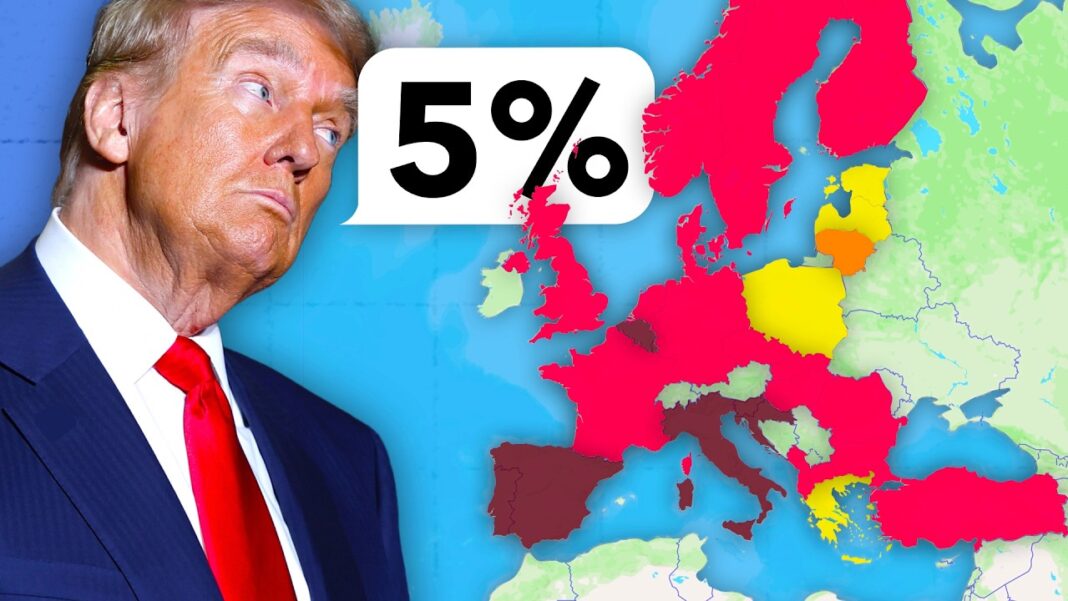|
Getting your Trinity Audio player ready...
|
Trump to Turn Up the Heat on NATO Freeriders, Demands Allies Pay Their Fair Share
Edited by: Fern Sidman
It’s bill paying time. According to a report in The New York Post, America’s most critical NATO allies have continued to fall short of their financial commitments to the alliance, despite repeated bipartisan warnings urging them to meet their obligations. Now, top officials in the Trump administration are making it clear: enough is enough.
In an exclusive statement to The New York Post, National Security Advisor Mike Waltz emphasized the urgent need for European nations to ramp up their defense contributions. “President Trump is absolutely right to demand our NATO allies invest more in their defense. With the largest conflict on their doorstep since World War II, now is the time for Europe to demonstrate their commitment to our alliance by increasing their spending to at least 5 percent GDP,” Waltz declared. He reinforced the administration’s commitment to pushing for greater burden-sharing, stating, “We will continue to have straightforward and blunt conversations to get NATO members to step up their share of the burden.”
Ric Grenell, the U.S. Special Presidential Envoy for Special Missions, echoed this sentiment in his remarks to The New York Post, stressing that failing to meet NATO commitments undermines the alliance’s stability. “Undermining NATO by not paying the fair share of your obligations to the alliance . . . is dangerous,” Grenell warned. His remarks reflect growing frustration among U.S. officials, particularly as NATO faces some of the most significant geopolitical challenges in decades.
As The New York Post report highlighted, NATO’s 32 member nations agreed in 2014 to dedicate at least 2% of their gross domestic product (GDP) to defense spending. This commitment followed Russia’s annexation of Crimea and escalating conflicts in the Middle East. However, a decade later, eight NATO members still fall short of this target, collectively underfunding their defense commitments by more than $42 billion, based on NATO data analyzed by The New York Post.
These nations include:
Spain – spending just 1.28% of GDP ($20.5 billion)
Slovenia – 1.29% of GDP ($917 million)
Luxembourg – 1.29% of GDP ($759 million)
Belgium – 1.3% of GDP ($8.24 billion)
Canada – 1.37% of GDP ($28.45 billion)
Italy – 1.49% of GDP ($33.32 billion)
Portugal – 1.55% of GDP ($4.47 billion)
Croatia – 1.81% of GDP ($1.57 billion)
According to the information provided in the report in The New York Post, while some nations have made progress, others have regressed. For example, Luxembourg increased its defense spending from 0.47% in 2021 to 1.29% today. Meanwhile, Italy’s defense spending fell from 1.54% in 2021 to 1.49% in 2024. Similarly, Croatia, which was close to the 2% target in 2021 with 1.95%, has since reduced its contribution to 1.81%.
While failing to meet their NATO obligations, many of these nations have directed substantial funding toward the United Nations Relief and Works Agency for Palestine Refugees in the Near East (UNRWA), an entity long scrutinized for its ties to Palestinian terrorism. The New York Post reported that at least nine UNRWA employees participated in Hamas’ October 7, 2023, massacre in Israel, according to an internal review of the organization. This revelation raises serious questions about these NATO members’ spending priorities, especially in the wake of increasing global security threats.
During his first term, President Trump made NATO spending a focal point of his foreign policy, pressuring allies to meet their obligations. The report in The New York Post noted that President Biden also maintained this pressure, particularly after Russia’s full-scale invasion of Ukraine in 2022.
Speaking via satellite at the World Economic Forum in Davos, Switzerland last week, Trump pushed NATO members to go beyond the 2% requirement, advocating for a new benchmark of 5% GDP. If implemented, this threshold would require the United States alone to contribute an additional $600 billion, a significant increase beyond its current 3.08% contribution.
As The New York Post report indicated, these financial disputes come at a critical moment for the alliance. With ongoing conflicts in Ukraine and rising global instability, NATO’s ability to function as a unified force is increasingly in question. Many within the Trump administration argue that U.S. taxpayers should not be left to shoulder the financial burden for European security while wealthier European nations fail to meet their minimum commitments.





